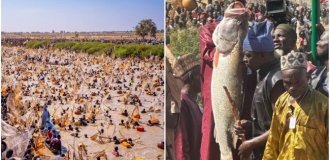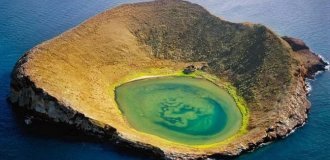Today, July 19, 36 years ago, the Summer Olympic Games opened in Moscow.
The 1980 Olympic Games, or - officially - the Games of the XXII Olympiad, took place in the summer in Moscow, the capital of the USSR, from July 19 to August 3, 1980.


These were the first ever Olympic Games in Eastern Europe. It was also the first Olympics held in a socialist country.

The 1980 Olympics were partially held in other cities of the Soviet Union: sailing regattas started in Tallinn.

Preliminary games and quarterfinals of the football tournament took place in Kyiv, Leningrad and Minsk; Bullet shooting competitions were held at the Dynamo shooting range in Mytishchi near Moscow.
The games are famous for the fact that more than 50 countries boycotted the Olympics due to the introduction of Soviet troops into Afghanistan in 1979. Some athletes from countries that boycotted the Games nevertheless came to Moscow and competed under the Olympic flag.

Due to the escalating political confrontation between the Warsaw Pact states and NATO, caused by the entry of Soviet troops into Afghanistan, some countries announced a boycott of the Games. Athletes from 65 countries, including the USA, Canada, Turkey, South Korea, Japan, and Germany, whose athletes are traditionally strong in summer Olympic sports, did not take part in the Games. China also planned to take part in the Summer Games (the Chinese had already competed at the Lake Placid Games in the winter of 1980) for the first time in decades, but boycotted the Olympics.
American fans in the stands of Luzhniki Stadium

Some athletes from Great Britain, France and Greece traveled to the Games as individuals, with permission from their Olympic committees, but the British and French teams were much smaller than usual. For this reason, the largest team in Western Europe became the Italian team, although the military athletes did not come from Italy. At the opening and closing ceremonies of the Olympics, 14 teams (Australia, Andorra, Belgium, Great Britain, the Netherlands, Denmark, Ireland, Italy, Luxembourg, Portugal, Puerto Rico, San Marino, France and Switzerland) marched not under national flags, but under the flag IOC.


One of the main apologists for the boycott of the Moscow Olympics was US President Jimmy Carter.

The symbol of any Olympics is the Olympic flame. On June 19, 1980, exactly a month before the opening of the Games, the Olympic flame, according to tradition, was lit in Olympia, Greece. The total length of the relay was 4992 km. The length of the relay stage across the territory of Greece is 1170 km (passed through Olympia, Athens, Delphi, Larissa, Veria, Sere, Promacho). The fire traveled 935 km across Bulgarian territory (Sofia, Plovdiv, Shipka, Pleven). The length of the Romanian stage is 593 km (Bucharest, Ploiesti, Focsani, Iasi).

On July 5, 1980, the fire crossed the border of the Soviet Union in the area of the village of Leusheni, Moldavian SSR. The fire traveled 2,294 km across the territory of the USSR. In Moscow, where the relay stage was about 54 km, the torch was met at the junction of the Minsk and Mozhaisk highways, then the flame was carried through the Arc de Triomphe on Kutuzovsky Prospekt, and a ceremony was held on the 50th Anniversary of October Square with the participation of representatives of the IOC, sports federations, and the Moscow administration. The night before the opening of the Games, the fire burned in the Mossovet building on Gorky Street. On the opening day, the fire was carried along Marx Avenue, Volkhonka, Metrostroevskaya Street, Komsomolsky Avenue, after which the torchbearers headed to Luzhniki.



The mascot of the Moscow Olympics was the Olympic Bear, the author of the emblem was Moscow children's book illustrator Viktor Chizhikov.


The closing ceremony of the Games of the XXII Olympiad took place on August 3 at the Central Stadium named after V.I. Lenin. The development of the script for the opening and closing ceremonies of the Moscow Olympic Games, all the directorial work on their preparation and implementation was carried out by the production team, headed by Joseph Tumanov and the chief director of the sports part of the scripts B. N. Petrov.
The white Olympic flag was slowly lowered to the sounds of the Olympic anthem. Girls in tunics approached the bowl with the Olympic flame and formed a composition reminiscent of an ancient Greek fresco. The Olympic flame in the bowl was slowly dying out.
On the screen of an artistic background made of colored shields, the image of Misha, the symbol of the 1980 Olympics, appeared. The inscription “Bon Voyage!” appeared, and a tear rolled down from the bear’s eye. An orchestra entered the stadium arena and performed a series of formations to the sounds of a march. Then the athletes entered the stadium field and performed exercises synchronously, each from their own sport.
At the very end of the closing ceremony, guests and television viewers were treated to a surprise that everyone still remembers. A huge Teddy Bear floated out to the middle of the stadium, holding on to multi-colored balloons, to the song of composer Alexandra Pakhmutova and poet Nikolai Dobronravov, “Goodbye, Moscow.” He waved his paw goodbye and began to slowly rise above the stadium until he disappeared into the Moscow night sky.
During the performance of the song, many spectators cried.

























